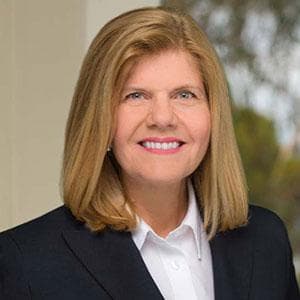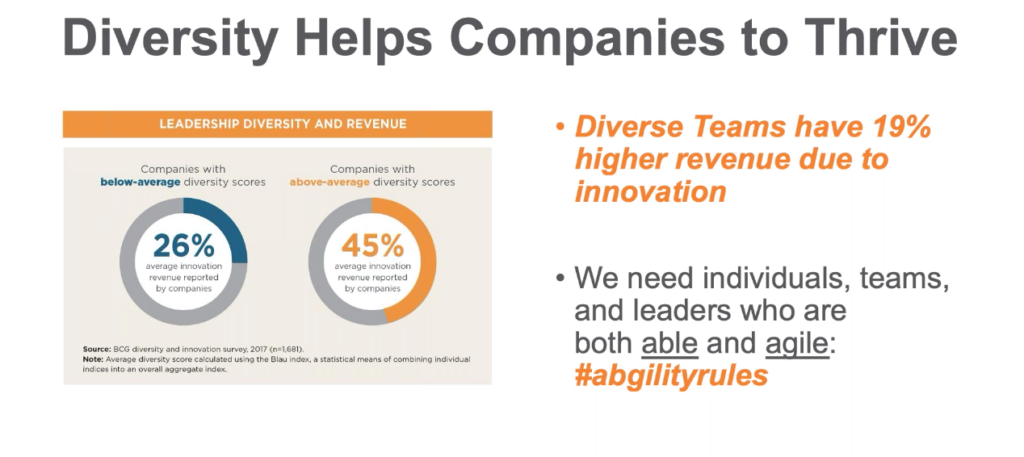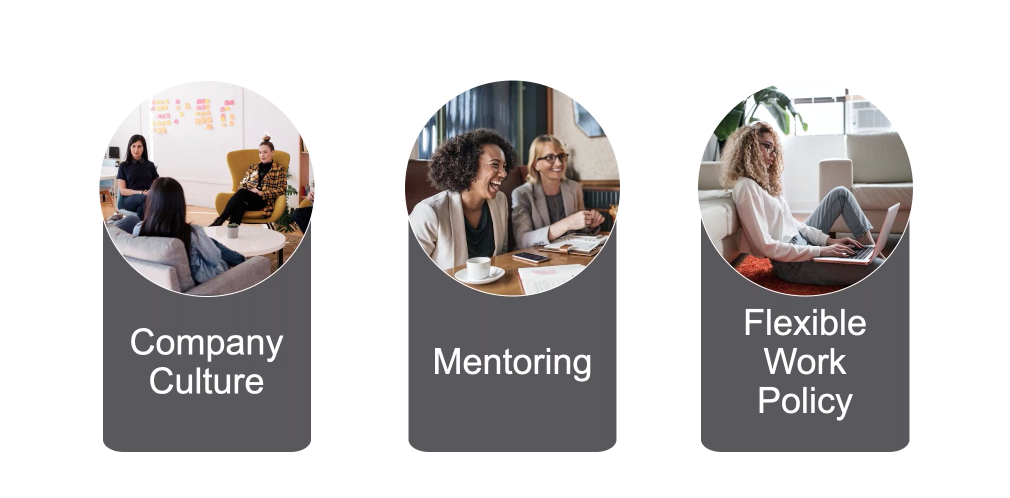The University of Tennessee, Knoxville’s Haslam College of Business’s recent Empowering Women in Supply Chain panel, hosted by Mary Long, explored the crucial roles of women in supply chain management seen through the lens of the recent white paper, Young Women’s Perspectives on Supply Chain Diversity and Inclusion, co-authored by Diane Mollenkopf and Long. Accompanying Long was an all-female panel of supply chain students and professionals who reflected on their experiences and amplified ways to build stronger and more inclusive supply chain environments.

The benefits of a more diverse and inclusive culture have been well-documented. Early on in the discussion, Long shared a relevant statistic that spoke volumes and drove the conversation that followed: diverse teams have 19% higher revenues, thanks to increased innovation. This research amplifies the voices of female students and young professionals regarding their experiences so far and expectations for the future.

The benefits of team diversity were echoed by the panelists, who recounted the various reasons they were drawn to supply chain management.
Why do women choose supply chain management?

Cassidy Hunsucker, who worked at Unilever before returning to The University of Tennessee, Knoxville’s Haslam College of Business to earn her MS in Supply Chain Management Online thanks to their reputation in supply chain expertise, recalled choosing supply chain management upon receiving advice from her father, a businessman who saw the opportunities offered by the growing field. Now a Global Demand Manager at Elo Touch Solutions, Hunsucker is glad she did.

Claire O’Steen was drawn to supply chain management by the way that supply chain roles allowed her “to combine technical skills with creativity and problem solving.” Claire’s final semester will be spent completing her capstone project in procurement with Supply Chain Forum partner, SAIC.

Caroline Jones, a senior at the University of Tennessee undergrad focusing on supply chain and president of NeXxus, a student organization dedicated to advancing opportunities in supply chain, says she pursued supply chain because of the variety of professional opportunities it could offer.
What at-work microaggressions do women in supply chain face?
The conversation then shifted to the challenges and obstacles faced by women in the supply chain workplace, a space that is still predominantly composed of and led by men.

The panel turned to its 390+ virtual attendees to participate in a series of polls about women’s experience in the workplace. The polling was based upon LeanIn.org/McKinsey study related to workplace microaggressions.
73% of responding attendees said ‘yes’ when asked “In your most recent role, have you felt the need to provide more evidence for your competence than others?”
“I believe women are expected to be more prepared and conscientious in many things they do,” said O’Steen,” confirming that she has encountered this expectation in various places where she has worked. Fellow panelist Hunsucker concurred: “I certainly agree that challenges, because I’m a woman, do exist.” Hunsucker put a positive spin on the inequities, noting that “challenges push me to be better, so I try to take it in a positive way.”
62% of responding attendees recounted being addressed in a less than professional way in the office or workplace.
73% of attendees participating in the poll responded ‘yes’ when asked “In your most recent role, have you had your judgement questioned regarding your expertise?”
47% of responding attendees reported hearing ‘demeaning comments about themselves or ‘people like themselves’ in the workplace.
More than others, the need to provide extra proof of one’s competence proved most damaging to productivity, according to the live poll.
What other obstacles were found transitioning from college to the professional world?

Combining findings of the white paper and their own recent experiences, the panel provided some insights about the transition from college into the workforce, as well as some hurdles they encountered.
Mounting Inadequacies
Feelings of inadequacies or being under-qualified are common when starting a new role at any stage of your career. Hunsucker, who’s been in the supply chain workforce for more than six years, stresses that you don’t need to know everything from day one.
Hunsucker also introduced the idea of a six month learning curve, for any role and any age, urging people not to get burned out in your first role.
Citing advice from Long’s research, the panel suggested young professionals who find themselves doubting their own abilities remind themselves that they were hired because the company chose them and as such, believes in them and their abilities.
The “Perfection Trap”
The next idea explored was the feeling “there’s something wrong with me,” that many young professionals feel when unable to complete a task perfectly.
A case study from a TED Talk was cited which featured a coding class: male students were reported coming into the professor’s office hours and saying “there’s something wrong with my code,” whereas female students would visit the same professor and report “there’s something wrong with me.”
This tendency for women to be hyper critical of themselves exists in supply chain as well. Panelists presented a real-life example of a female intern who managed to increase one of her company’s efficiency metrics from 11% to 92%. However, the improvements were credited to her manager, a man, and never attributed to her. Ultimately, this woman was denied a full-time employment offer she deserved.
Gaining Respect & Being Valued
Young women in supply chain are often pushed into organizer roles in projects, a trend that was identified by Long’s white paper and confirmed by the panelists. Finding a balance between helping your team stay on top of tasks but, at the same time, not regularly taking on this organizational duty, can be a real challenge.
The best advice panelists could offer to avoid this pattern was to establish boundaries. Too often in life, people take advantage of others and rebuffing and navigating these tendencies is a skill that requires practice.
“In a supply chain context, it’s even more common to find yourself on a team where you’re one of, if not the only, woman,” notes Caroline Jones. This can amplify the anxieties of being taken seriously.
How are best practice supply chain companies making women feel more included at work?

Company Culture
By being aware of the challenges women and other minorities face in the workplace, managers and companies can begin to create a more inclusive work environment. Studies show that the companies who are succeeding at maintaining workforces are finding ways to retain them.
A company whose culture makes the voices of their female employees heard is more likely to retain female workers and produce more innovative outputs. Conversely, companies who fail to value and promote female employees are more likely to fall behind.
Mentoring
Sometimes mentoring happens organically in the workplace. In other work environments, mentoring is the result of a more structured program. Both can be enriching, as women interviewed as part of Long’s whitepaper confirmed, expressing that they “appreciated having some varied experience” in their mentors, receiving mentorships from senior leaders as well as their peers, who can show them the ropes.
A mentor can be an advocate if an employee is feeling gender bias or encountering some other bias. Well-designed mentorship programs make it easier for female supply chain employees to flag an issue when it arises. Mentorship can also alleviate frustrations by acting as a sounding board and providing alternative perspectives of situations or policies that seem unfair or ill-conceived.
Panelists also pointed out that mentors can come from unexpected places and organizations. Your mentor doesn’t have to be at your current company, reminds one panelist, so be sure to nurture relationships from all points of your career. Mentors can also come from organizations outside those where you’ve worked, so be open.
Flexible Work Policies
Even before COVID-19, many companies have been moving to more flexible schedules and work-from-home options, policies that can be invaluable to any working parent. Just a few years ago, the option to work from home may not have existed and the choice would have been to stay in the office or quit. Today, flexible work policies are becoming more and more common, keeping morale high and employees on board.
Panelists were also optimistic that responses and changes in work policies across supply chain companies may lead to more flexible policies in the future. More and more employers are beginning to see that work-from-home can work well. In some cases, working from home proves more efficient than existing on-site practices, teaching managers what work should be done in the office and what work should and can be done remotely.
What are the best practices to attract, retain and promote women in supply chain roles?

Managing the Pipeline
To see further improvements regarding the inclusion of female employees in the supply chain workplace, Dana Stiffler, a Vice President at Gartner, Inc., polled more than 150 supply chain professionals. What she found was that integrated pipeline planning—developing, promoting and sponsoring women—was considered most crucial for both attracting and retaining female supply chain workers and for seeing women make their way up the executive ranks. Other efforts, like changing culture values, improving outreach practices, adjusting shift policies, and giving more visibility to female leaders and success stories were also cited as practices that could increase the presence and prominence of women in supply chain.
Gender vs. Age: What’s a bigger hurdle?
Finally, when posed with the question, “Which has been a bigger professional hurdle, age or gender?”, panelists were split, feeling as much, if not more scrutiny due to their young age as they did for being a female in a male-dominated industry.
The University of Tennessee, Knoxville’s Haslam College of Business’s Commitment to Diversity
At The University of Tennessee, Knoxville’s Haslam College of Business, we believe that the best learning environment is a diverse one, composed of individuals from different backgrounds and life experiences. Initiatives like the Empowering Women Panel are one of many efforts made by the MS in Supply Chain Management Online program to ensure all students feel welcome as we maintain our dedication to seeing the DNA of our online class represent a variety of perspectives.
Thanks to the research of Long and Mollenkopf and the continued efforts of AWESOME, like their “Reach” framework, intended to uncover actionable steps to move the needle on supply chain diversity, the rewards and innovation linked to a diverse supply chain team are becoming increasingly evident. Such progress and inclusion will become even more valuable as the industry adjusts to the changes being made to international commerce during this unprecedented time. The University of Tennessee, Knoxville’s Haslam College of Business prides itself on staying ahead of the curve in all things supply chain; embracing diversity is a key component to that mission.
